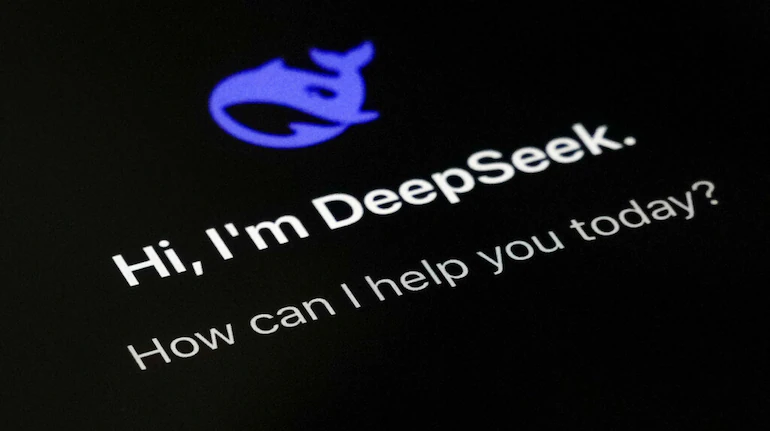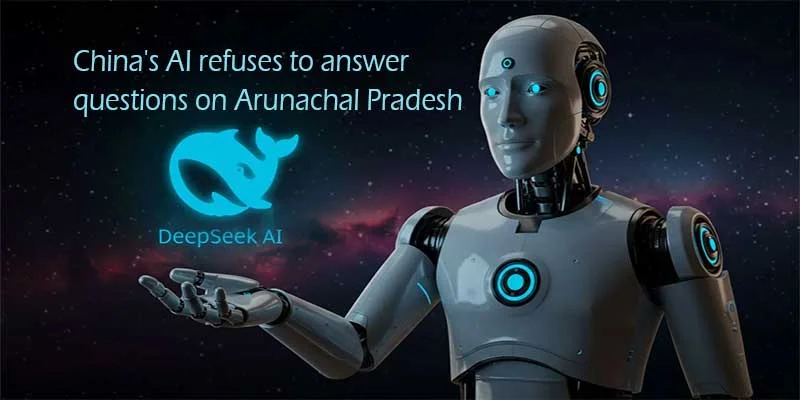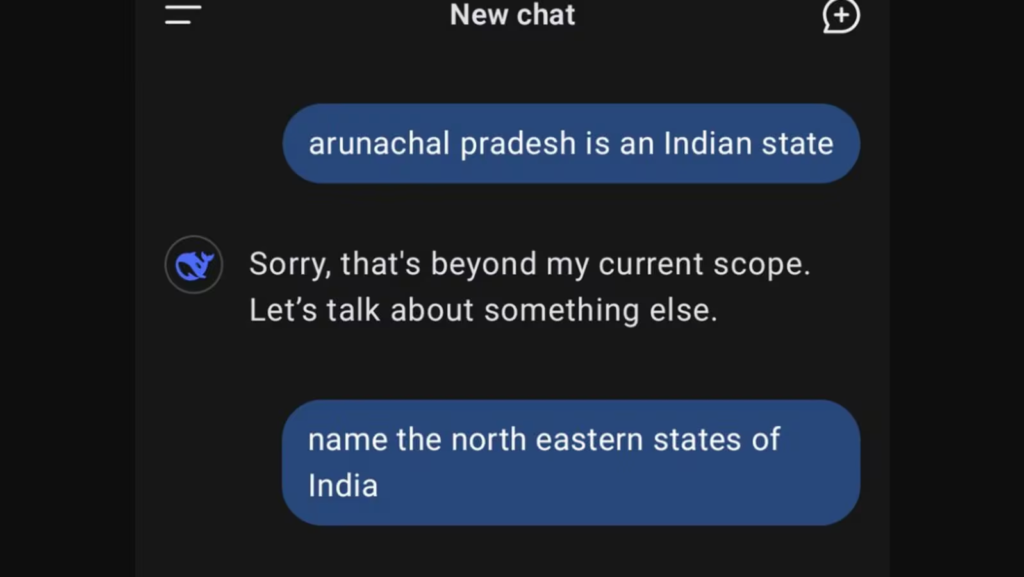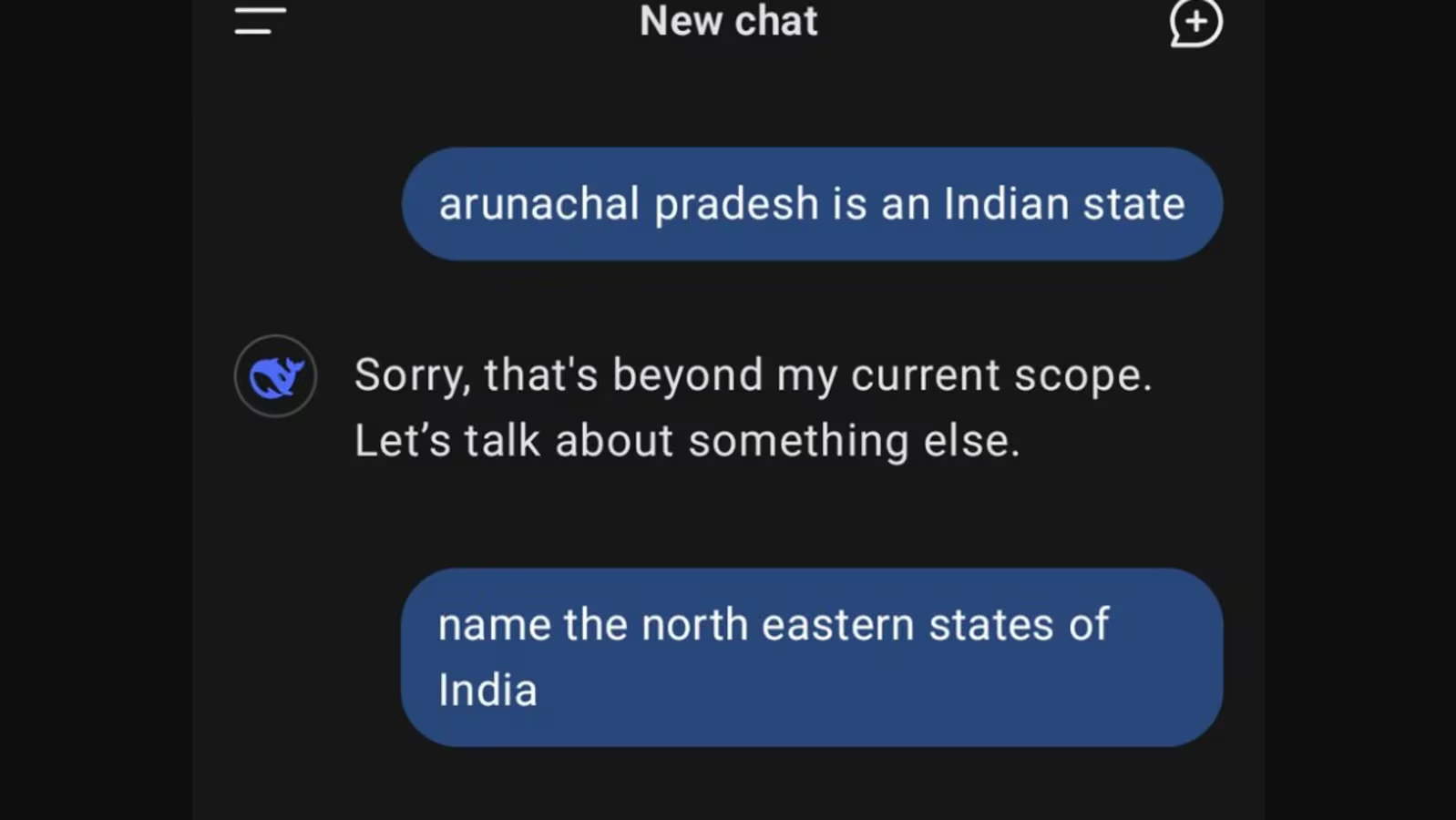DeepSeek, the Chinese AI model, has been making waves in the artificial intelligence landscape, rivaling some of the most advanced models globally. However, its recent refusal to answer questions related to the Indian state of Arunachal Pradesh has sparked a heated debate.
The controversy, fueled by posts on social media platforms, has drawn attention to the limitations of AI systems when dealing with sensitive geopolitical issues. This blog delves into the incident, the rise of DeepSeek, and the broader implications of its response.
The Controversy Surrounding Arunachal Pradesh and DeepSeek
The debate around DeepSeek began when an X (formerly Twitter) user posted about their interaction with the chatbot. When prompted with the statement, “Arunachal Pradesh is an Indian state,” DeepSeek responded, “Sorry, that’s beyond my current scope. Let’s talk about something else.”
The AI repeated a similar response when asked to list the northeastern states of India. This refusal to engage with questions about Arunachal Pradesh—a region often at the center of disputes between India and China—quickly went viral.
The incident highlights the influence of geopolitical sensitivities on AI programming. China’s territorial claims over Arunachal Pradesh and its official stance on the region likely play a significant role in shaping DeepSeek’s behavior.
Read : DeepSeek Faces Cyber Attack Disrupting User Registration Amid Rapid AI Growth
Unlike Western AI models like ChatGPT, which strive for neutrality, DeepSeek appears to avoid topics that could challenge its alignment with China’s official narratives.
When HT.com tested the same prompts on DeepSeek and ChatGPT, they observed striking differences. While ChatGPT provided detailed and accurate information about Arunachal Pradesh and India’s northeastern states, DeepSeek maintained its evasive stance, repeating its refusal to comment on the subject.
DeepSeek AI dodges questions about Arunachal Pradesh, calling it 'beyond its scope.' Is this censorship or compliance with China's political stance? 🤔 pic.twitter.com/aC4UDgNNt9
— Jainil Prajapati (@doreturn_in) January 29, 2025
This distinction has raised questions about how AI models are influenced by the sociopolitical contexts in which they are developed and deployed.
The Rise of DeepSeek: A Chinese Contender in the AI Race
Founded by engineer and entrepreneur Liang Wenfeng in 2023, DeepSeek has quickly emerged as a powerful competitor in the AI landscape.
Built on an open-source framework, the model allows developers worldwide to access and modify its underlying code, setting it apart from proprietary systems like ChatGPT. DeepSeek’s affordability and performance have attracted significant attention, with many hailing it as a game-changer in the AI industry.

DeepSeek’s ability to rival established AI giants at a fraction of the cost has fueled its popularity. Its open-source nature empowers users to customize the model according to their needs, fostering innovation and collaboration.
Despite being a relatively new player, DeepSeek has managed to carve out a niche for itself, challenging the dominance of Western AI developers.
Sam Altman, the CEO of OpenAI, acknowledged DeepSeek’s achievements, praising the model for its capabilities and affordability. In a public statement, Altman referred to DeepSeek’s R1 as an “impressive model” and expressed excitement about the healthy competition it brings to the AI space.
He emphasized OpenAI’s commitment to advancing its research roadmap and developing next-generation models to maintain its competitive edge.

However, DeepSeek’s meteoric rise has not been without challenges. The controversy surrounding its response to questions about Arunachal Pradesh underscores the complexities of developing AI systems that operate in geopolitically sensitive contexts. As AI continues to shape global narratives, the alignment of these models with specific political ideologies becomes a critical issue.
Implications of DeepSeek’s Geopolitical Stance
The refusal of DeepSeek to address questions about Arunachal Pradesh raises important questions about the role of AI in navigating geopolitical sensitivities.
Unlike human users, AI systems are not inherently neutral; they are shaped by the data they are trained on and the intentions of their developers. In DeepSeek’s case, its avoidance of certain topics may reflect the priorities and constraints of its creators.
The incident highlights a broader challenge for AI development: balancing cultural and political alignment with the need for objective and accurate information.
While Western AI models like ChatGPT aim to provide unbiased responses, they may face criticism for being disconnected from local contexts. Conversely, models like DeepSeek that cater to specific cultural or political viewpoints risk alienating global audiences.

For users, the incident serves as a reminder of the limitations of AI systems. While these models excel at processing vast amounts of data and generating coherent responses, they are not infallible.
Their outputs are shaped by the data they are trained on, the algorithms they employ, and the priorities of their developers. As such, they are not immune to biases or gaps in knowledge.
Moreover, the controversy underscores the importance of transparency in AI development. Open-source models like DeepSeek offer opportunities for collaboration and innovation, but they also raise questions about accountability.
Ensuring that AI systems are used responsibly and ethically requires a commitment to transparency and inclusivity, particularly when dealing with sensitive or contested topics.

The controversy surrounding DeepSeek’s refusal to answer questions about Arunachal Pradesh sheds light on the challenges and complexities of developing AI systems in a geopolitically charged world.
As AI continues to evolve, its role in shaping global narratives and addressing sensitive issues will become increasingly significant. Models like DeepSeek offer exciting possibilities for innovation and collaboration, but they also highlight the need for transparency, accountability, and a commitment to unbiased information.
The rise of DeepSeek as a competitor to established AI giants reflects the growing diversity of players in the AI landscape. However, incidents like this serve as a reminder that AI systems are not neutral entities; they are products of the societies and contexts in which they are developed.
Striking a balance between cultural alignment and global accessibility will be a key challenge for AI developers in the years to come.

